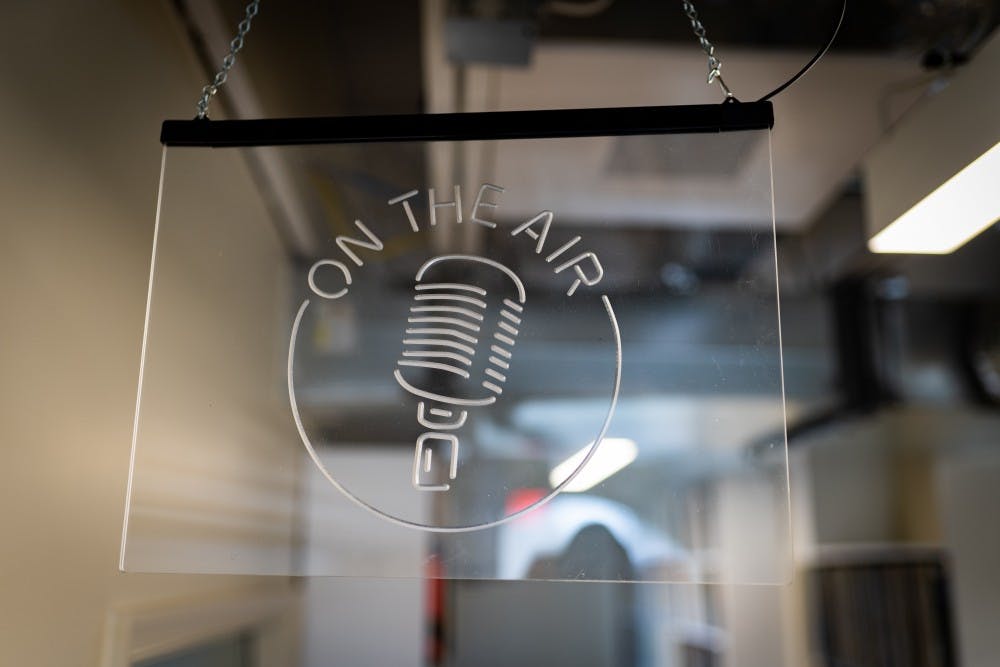The American college experience is iconically defined in popular culture by several universal markers — lively Greek life, hip campus coffee shops and of course, the cultural force of a student-run radio station. WTJU — and its companion, entirely student-run sister station WXTJ — have served as the University’s broadcasters for over 60 years since its founding in 1957.
The radio station finished moving its headquarters Saturday from the common area of the Lambeth Field Apartments — where it has broadcasted from there since 2000 — to a new space at 2244 Ivy Road. The new location is off-Grounds — making commuting a slightly more difficult endeavor for student DJs. As a larger space with a built-in performance stage, it was chosen to meet the needs of a growing station that is trying to be more community-focused.
WTJU hopes in this new era of its existence to collaborate with performers, student CIOs and members of the Charlottesville community as a whole.
“We're at our best when we are the ... bright shining thread that runs through the fabric of our community,” said General Manager Nathan Moore, who joined WTJU in 2011 after working in national radio.
To inaugurate their new space officially, WTJU hosted an Open House event on Saturday and distributed free t-shirts and stickers to a diverse crowd of Charlottesville residents, families, University students and volunteers coming together to celebrate the station’s milestone.
Guests entered the first floor area, home to the new performance stage where just last week WTJU broke a Guinness World Record the week prior by having over 80 DJs hosting one radio show. Fitting so many bodies in one recording space was only possible because of the 2,600 square feet of room now available to the radio station. The move cost half a million dollars in total, and Moore said that $300,000 of the funds came from the University directly, with the rest being fundraised on air.
Coming from the confined and dimly lit environment of the Lambeth Field Apartments, the new studio lets in ample light and provides plenty of space for WTJU to grow into. The station hopes to push radio forward and pursue in-person events.
While the new station headquarters provide a more pleasing and well-lit view to the eye, some felt conflicted about losing the character of the former Lambeth location.
“I loved the dark-stained wood tables, the low lighting, the minimal wall space because of all the posters and art, the privacy [in the old studio],” said first-year College student and DJ Caroline Hullman. “It felt lived in, and I miss that.”
The new features like “brighter walls, un-stained wood, a big window” provide what Hullman feels is a new character of its own that student DJ’s like her will likely have to get used to as the station adapts to new priorities beyond traditional radio. She values the added feeling of legitimacy of “not being as dependent on U.Va.” by virtue of being off-Grounds — even if much of the move was financed by the University, funds WTJU. The station is also backed by additional funds from private donors.
“I think for radio to adapt and serve as this cultural institution going forward it has to be not just on-air but also online and in-person,” said Moore. “While Lamberth served us very well, it was a struggle to grow that in-person part in a dorm complex.”
Moore added that an in-person focus would not take away from the station’s music and radio legacy.
“We have a foot in both and we're really proud to be a bridge between those two,” he said.
In addition to the legacy equipment brought in from Lambeth, WTJU now has access to a more digital and modern suite of tools and technology that will enable new types of content production, such as student-led podcasting efforts.
The station’s newer facilities are high-tech, but Moore said they like to envision themselves as “technology-agnostic,” viewing the new equipment as a tool providing opportunities for more free creation as opposed to being benefits in their own right. The bulk of excitement centers around the forward-thinking potential that the Ivy Road location presents, though several student DJ’s expressed mixed feelings about the move.
“I will miss being on Grounds,” said DJ and second-year college student Mara Guyer. “I think there's still some frustration about feeling pushed out and some nostalgia for the station where all the current student DJs started out.”
Second year College student and DJ Gabrielle Ringer mentioned missing the unique culture of the classic Lambeth headquarters.
“It was covered in art that students made, posters, and stickers from bands that came to Charlottesville,” she said.
Guyer, who has access to a car, finds getting to Ivy Road is not significantly harder, but she worries about the proposition for students without a vehicle.
“For DJs without access to a car and with show hours that don't line up with the bus schedule, accessibility is a frustrating problem to tackle mid-semester,” said Guyer.
For drivers, a parking lot offers a welcome upgrade from Lambeth, but not everyone will benefit from the new arrangement.
“There are parking spaces so it's easier to drive to, but not as pedestrian, bike, or public transport friendly,” said Ringer, mentioning the added burden the new location places on car-less commuters.
Beyond site accessibility concerns, Guyer and Wringer both expressed general optimism for the new resources and opportunities available to the station and its volunteers.
“I'm definitely excited to make use of the performance space downstairs, especially since we can play that sound over the air on WXTJ,” said Guyer. “The phone in the old studio could be unreliable, too, so I'm [also] excited by the prospect of taking more calls and experimenting more with that side of our show.”
The Open House event on Saturday served as a celebration of the station managing to get through the big move and to break a Guinness World Record the week before. That celebration was open and accessible to the community, with free food and artisanal sodas served out of kegs as tours of the new space were provided.
“We can make this a really nice home and it can be a really nice home that we can share with our broader community,” said Moore.
Guests gathered not just for t-shirts and food, but to celebrate a local radio scene that WTJU serves to keep alive. Moore recognizes the importance of these social events and general public engagement, describing what he admits is a corny but useful motto, “A community radio station doesn't get very far without a community.”
With the half-million dollar move completed, Moore’s WTJU hopes to continue growing into what it envisions as its future potential. Student DJ’s are not pleased with the logistical situation but find reason to be hopeful with the new resources available to them.
“I'm optimistic that we will find different ways to make and celebrate art in this new space,” said Guyer.
Having recently finished the intensive process of moving, student volunteers like Guyer also have practical reasons to celebrate the occasion.
“I'm looking forward to getting Italian food at the place next door,” she added.







